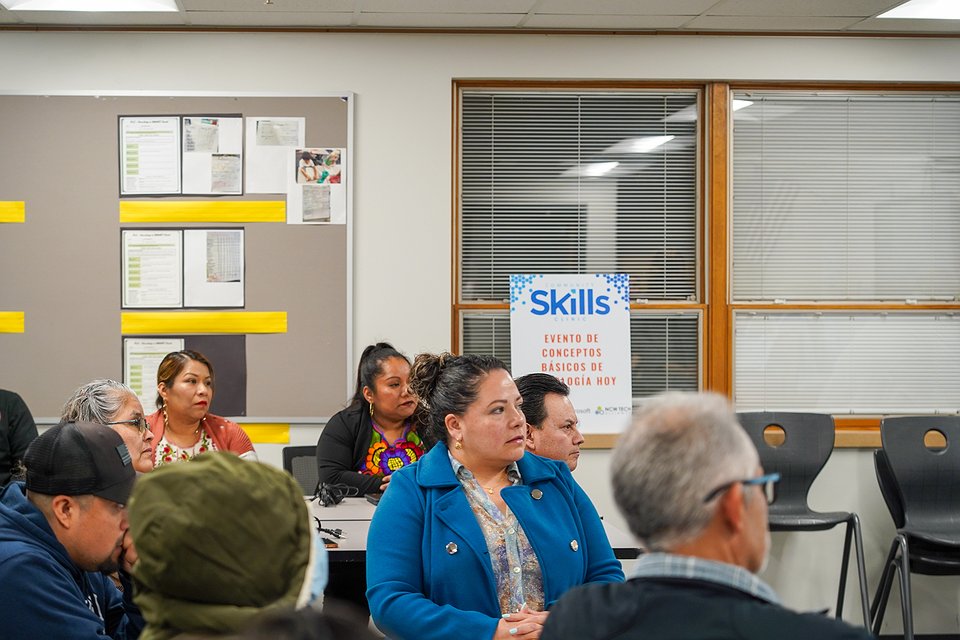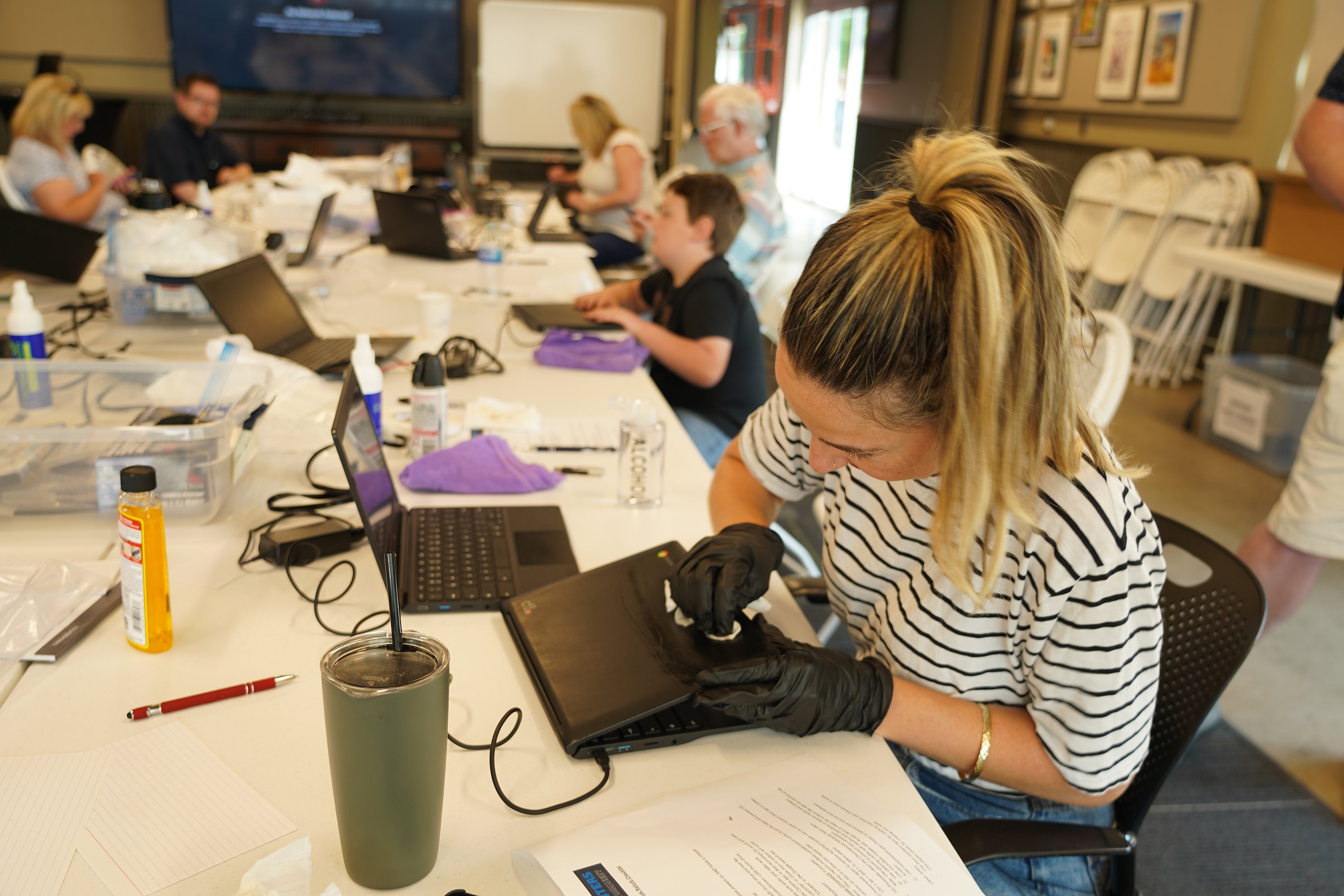Bridging the digital divide
MOSES LAKE — In today’s digital world where farmers use GPS systems to operate combines, artificial intelligence runs machines to sort apples by grade and banking and health care are both accessed online, digital access matters, said Sue Kane, CEO of NCW Tech Alliance. Bridging the gap between tech and people is vital for quality of life and economic growth, she said.
“As many as one in four people don’t have access to the connectivity that they need, and so you really think about that group of individuals being stunted in their capacity, both from an economic development standpoint and an education standpoint. The ways that they can contribute and the ways that they can benefit from technology are all limited by this access issue,” Kane said.
Accessibility — either because of financial constraints or a lack of infrastructure — is just one layer of digital equity’s proverbial onion, Kane said. Digital literacy for those who have never been around computers or smart devices that much, whether because of age, culture or economic conditions, is a barrier to success. Those barriers ripple out into the community because the individuals' limited access to technology limits their access to myriad things in today’s digital world.
“There’s these other layers that, whether they’re demographic aspects like being unbanked or being low income, or having come from a background where you have less education opportunities. You maybe just don’t have the skills. Those are all factors that prevent us from being able to really unlock the potential of those individuals,” she said.
The nonprofit NCW Tech Alliance started in the Wenatchee area in 1999 by business people who Kane said wanted to utilize technology like high-speed internet to push the economy of the region forward. The Tech Alliance officially opened its Moses Lake location at 1000 Bolling Street NE on June 28.
The organization works to lay in the digital foundation for the communities it serves to prosper in several ways. That includes education, distributing tech to those in need, advocating for policy that helps improve access to technology, which in turn improves economic opportunities not just for the individuals they help, but for the communities that benefit from a better-skilled population.
“That’s really where our call to action is, for digital equity and really creating wraparound supports. Be able to do things like (offer) technology classes that are being taught in Spanish to build basic digital literacy – how to get connected to the internet; how to navigate the internet safely; what are some of the best practices for cybersecurity; how to do email communication,” Kane said.
There’s often surprise that those skills aren’t in place for people when she speaks with community members, Kane said. Most people are digital natives now, so finding someone who doesn’t understand email, setting up a computer or using online banking is a surprise for those who take it for granted. However, the gap exists and the demand for services is present throughout North Central Washington in NCW’s roughly 17,000-square-mile service area, especially among seniors and those on fixed incomes.
Teaching the skills and ensuring devices are available helps to not only help area residents contribute to their communities, it keeps them safe. Digital literacy includes things like knowing how to avoid scams online, understanding how to identify false information on social media and knowing how to shop online without putting sensitive information at risk of being compromised.
According to the FBI, Americans lost more than $10.3 billion to internet scams in 2022. Reports and advice released by the FBI and Federal Trade Commission indicate that simple digital literacy could have prevented a great deal of that loss.
By increasing digital literacy, NCW Tech Alliance hopes to prevent financial losses, but also to improve overall quality of life. Digital access means more access to health care, banking options, online shopping, education and other essential 21st-century services. It’s about creating synergy between digital users and the communities they live in. The skills learned help the local workforce, improve community financial prospects and make the area more inviting to employers that want to stick around long term, Kane said.
With opportunities to build on the North Central Washington economy presenting themselves in Moses Lake, developing the basic computer skills needed is essential. Clean energy technology is a great opportunity for the region, alongside existing aerotechnology and agriculture, and having organizational partners like Big Bend Community College and others able to adjust their programs to support new industries with further community support from Kane and her staff helps the community grow in a positive way, she said.
“In the long term, when we talk about developing a sustainable ecosystem for economic development, for the tech sector, having those programs so closely aligned, and having them be arming youth and adults (as well as) incumbent workers with those technology skills to make them more productive, more efficient, really highly trained individuals — so that they’re the most competitive candidates — means that (businesses) don’t have to go looking somewhere else,” Kane said.
R. Hans “Rob” Miller may be reached at [email protected].
NCW Tech Alliance
ncwtech.org
509-661-9000
[email protected]
1000 Bolling Street NE
Room 1002
Moses Lake, WA 98837
By the numbers:
According to NCW Tech Alliance’s 2023 annual report, the organization had several successes last year. Those include:
- Distribution of 177 devices to those in need
- Education classes served more than 3,000 people
- More than 45 community events including an AI Expo and digital navigator trainings
- More than $174K raised and distributed to nonprofits, community organizations, startups and scholarship recipients
- More than $300K awarded to attendees of the organization’s annual Flywheel Investment Conference
NCW Tech Alliance funding sources:
- 83.3% – Grants
- 10.7% – Sponsorships
- 1.6% – Ticket Sales
- 1.7% – Memberships
- 2.8% – Other
NCW Tech Alliance expenditures:
- 76.9% – Programs
- 11.6% – Administration
- 6.8% – Membership Support
- 4.8% – Fundraising Costs
Want to click in and help?
NCW Tech Alliance is accepting volunteers and offering training for those who help others navigate digital spaces. For more information, visit NCWTech.org or call 509-661-9000 or email [email protected]. Opportunities are also available for training on how to help others access and use the digital world. This training may be useful for those who often give instructions to those who are unfamiliar with digital tools such as administration and operations staff.





